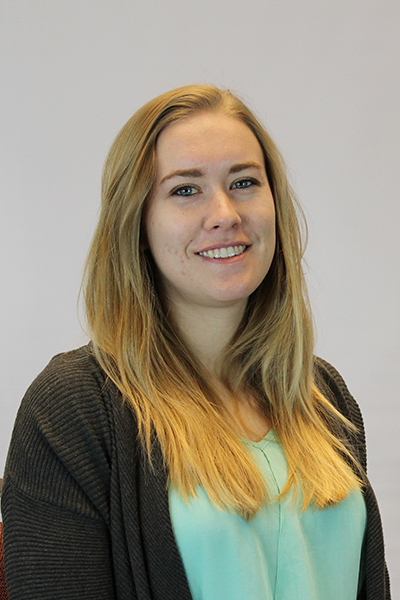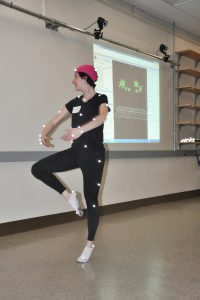Marissa Thill, MS, graduated from the School of Kinesiology with a Bachelor of Science in Kinesiology in 2016. Her undergraduate experience inspired her to move to Liverpool, England, where she received her Master of Science from Liverpool John Moores University in 2017. Thill is now using her education to lead sport science research for Empiricus, a health intelligence start-up company. Health intelligence is the interpretation, analysis, processing and generation of useful products that assist individuals such as public health practitioners, clinicians, responders, decision and policy makers and wider stakeholders in making sense of health surveillance data, and using it to better achieve goals. Get to know Thill and read about her career journey below:
Can you tell us a bit about yourself?
I grew up in a small town in Wisconsin, about 30 minutes north of Milwaukee. My high school graduating class was 64 people, so making the decision to come to one of the largest universities in the country was a huge step for me. But coming to the U of M and moving to Minneapolis was one of the best decisions of my life. Without my experiences at the U of M, I wouldn’t have had the courage to move to Liverpool, England, pursue my master’s degree, and have some of the best experiences of my life, both personally and in my education. My interests include fitness, training, travel, hiking and music. I cannot wait to be able to get back out and explore our world once we can safely do so!
Can you describe your career in detail?
During the completion of my master’s degree, I was approached by Ron Pruitt, who is now my CEO. At the time, he was a co-worker of my father’s. He was thinking about a start-up company. He wanted someone who had experience in sport science and research on his team and wanted my opinion on his idea. In the spring of 2018 he reached out again, asking if I would like to come on board to help develop Empericus. Empericus is a health intelligence platform that integrates an athlete’s historical medical record with the latest advances in sports science and sports medicine. The resulting analysis provides medical staff, trainers, therapists, and coaches with the insights they need to help athletes achieve their full potential.
Soon after I started we became a trusted co-development partner of Microsoft, demonstrating our best-in-class capabilities. This sky-rocketed us to working with the NASCAR team Hendrick Motorsports, who helped us to develop the platform even further. As with a lot of companies, we were hit hard by the COVID-19 pandemic and had to fight to survive. This did create a bump in the road, but we knew our product was unique and had the opportunity to be successful. Fortunately, Empericus has now positioned itself to join with one of the most recognized brands in sports for global growth. (Official announcement coming soon!)
This project has taught me so many things about the world of a start-up company, working in business, research, and organization, all while utilizing the knowledge of my degrees. I am so excited to share everything that Empericus has to offer with the sport science community very soon and to continue to be a part of the health intelligence revolution!
What inspired you to get a BS in Kinesiology?
I started my undergraduate experience at the [U of M’s] College of Biological Sciences, but I was pulled to the kinesiology degree because I had an interest in becoming a physical therapist or athletic trainer. The summer after my freshman year I shadowed both careers and decided that kinesiology was the path I wanted to take.
How do you think your experience in the School of Kinesiology has helped you reach your goals?
The School of Kinesiology exposed me to a variety of topics and career paths that I could explore after graduation. I remember really enjoying KIN 3131 History and Philosophy of Sport, taught by Maureen Weiss, PhD. She pushed us to look holistically at kinesiology, health, and wellness. And, she talked about the need for all areas of expertise to work together to achieve goals. This way of thinking has applied to my career and research, and helped me to better understand how to help athletes reach their goals.
What were some of your best experiences at the U of M?
My best experiences came from trying to discover what my true passions were. First, I had an Athletic Medicine internship through the athletic department. I was able to put some of my knowledge into action, working hands-on with a lot of athletes. Working one-on-one with the trainers allowed me to ask questions about training and injuries. My experience with athletic medicine inspired me to pursue research within the field, where I found my true passion, biomechanics.
Hands-down the most valuable experiences I had were in the Human Sensorimotor Control Lab (HSCL), directed by Jürgen Konczak, PhD. I got to create my own research project, gaining valuable skills that helped me during my master’s degree. I gained mentorship from not only Dr. Konczak, but all of his graduate students. They helped me reach my full potential, and pushed me to learn more about motor control and biomechanics. Without these valuable experiences, I would not be where I am today in my career.
What were some of your challenges at the U of M?
My freshman and sophomore years were challenging. It was difficult to adjust to the college curriculum, and I did not know where I wanted to go in my career. KIN 1871 Survey of Kinesiology, Recreation, and Sport helped me discover what I enjoyed. I remember the moment I discovered the world of biomechanics and motor control in class. I couldn’t stop thinking about it. Immediately after class I did as much research about it as I could. I had a gut feeling that I had found what I was meant to study after that, and am so grateful that KIN 1871 showed us every facet of Kinesiology.
What advice would you give to those wanting to pursue a degree in Kinesiology?
Find your true passion and get as much experience in it as you can! Explore everything that kinesiology has to offer, and if you think you know what you would like to do, go get experience in it! The U of M offers so many ways for undergraduates to get involved and discover what they enjoy. If you feel you cannot do something during the school year, look for experiences during the summer. I was fortunate enough to work in a biomechanics lab in Milwaukee during my summers, which helped solidify me wanting to pursue a master’s degree.
Parting thoughts?
A quote that I have found extremely helpful is “Do your future self a favor, and work hard today.”
I would like to thank Dr. Konczak and the HSCL lab family, for helping me to find my footing and teach me invaluable lessons about research and biomechanics. I would also like to thank Naveen Elangovan, PhD, for being a mentor during my undergraduate career and for continuing to be a mentor and someone that I can reach out to for advice.





